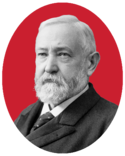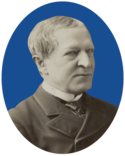
1888 Republican National Convention
| 1888 presidential election | |
  Nominees Harrison and Morton | |
| Convention | |
|---|---|
| Date(s) | June 19–25, 1888 |
| City | Chicago, Illinois |
| Venue | Auditorium Theatre |
| Chair | Morris M. Estee |
| Candidates | |
| Presidential nominee | Benjamin Harrison of Indiana |
| Vice-presidential nominee | Levi P. Morton of New York |
| Other candidates | John Sherman Russell A. Alger Walter Q. Gresham |
| Voting | |
| Total delegates | 832 |
| Votes needed for nomination | 417 |
| Results (president) | Harrison (IN): 544 (65.38%) Sherman (OH): 118 (14.18%) Alger (MI): 100 (12.02%) Gresham (IN): 59 (7.09%) Blaine (ME): 5 (0.60%) McKinley (OH): 4 (0.48%) Others: 1 (0.12%) |
| Results (vice president) | Morton (NY): 592 (71.15%) Phelps (NJ): 119 (14.3%) Bradley (KY): 103 (12.38%) Bruce (MS): 11 (1.32%) Abstaining: 6 (0.72%) Walter S. Thomas: 1 (0.12%) |
| Ballots | 8 |
The 1888 Republican National Convention was a presidential nominating convention held at the Auditorium Building in Chicago, Illinois, on June 19–25, 1888. It resulted in the nomination of former Senator Benjamin Harrison of Indiana for president and Levi P. Morton of New York, a former Representative and Minister to France, for vice president. During the convention, Frederick Douglass was invited to speak and became the first African-American to have his name put forward for a presidential nomination in a major party's roll call vote; he received one vote from Kentucky on the fourth ballot.

The ticket won in the election of 1888, defeating President Grover Cleveland and former Senator Allen G. Thurman from Ohio.

Venue
The convention was held in Chicago's Auditorium Theatre. Since the construction on the theater had not been completed in time for the convention, a tent canvas was utilized as a temporary roof during the convention.[1] Controversy was generated, with labor movement supporters taking issue with the non trade union labor utilized in the construction of the Auditorium Building (which the theater is a component of).[2]

Issues addressed


Issues addressed in the convention included support for protective tariffs, repeal of taxes on tobacco, support for the use of gold and silver as currency and support for pensions for veterans. The party also expressed its opposition to polygamy.[3]

Presidential nomination
Nominated
Not Nominated
The early favorite for the nomination was James G. Blaine.[4] After he disclaimed interest, several candidates vied for the prize, with the frontrunners being Russell A. Alger, Walter Q. Gresham, Chauncey Depew, and John Sherman.[4] After several ballots, none of the leading candidates was able to obtain a majority. Benjamin Harrison, who had served in the U.S. Senate from 1881 to 1887, but had lost reelection after the Democrats gained control of the Indiana legislature, was a dark horse candidate.[4][5] Republicans were dispirited after losing the presidency in 1884 and were attracted to Harrison because of the speech announcing his presidential candidacy, in which he described himself as a "living and rejuvenated Republican."[5] Harrison won the nomination on the eighth ballot and "Rejuvenated Republicanism" became the party's campaign slogan.[5]

| Presidential Balloting | ||||||||
|---|---|---|---|---|---|---|---|---|
| Candidate | 1st | 2nd | 3rd | 4th | 5th | 6th | 7th | 8th |
| Harrison | 85 | 91 | 94 | 216 | 212 | 231 | 279 | 544 |
| Sherman | 229 | 249 | 244 | 235 | 224 | 244 | 230 | 118 |
| Alger | 84 | 116 | 122 | 135 | 143 | 137 | 120 | 100 |
| Gresham | 107 | 108 | 123 | 98 | 87 | 91 | 91 | 59 |
| Allison | 72 | 75 | 88 | 88 | 99 | 73 | 76 | 0 |
| Depew | 99 | 99 | 91 | 0 | 0 | 0 | 0 | 0 |
| Blaine | 35 | 33 | 35 | 42 | 48 | 40 | 15 | 5 |
| Ingalls | 28 | 16 | 0 | 0 | 0 | 0 | 0 | 0 |
| Phelps | 25 | 18 | 5 | 0 | 0 | 0 | 0 | 0 |
| Rusk | 25 | 20 | 16 | 0 | 0 | 0 | 0 | 0 |
| Fitler | 24 | 0 | 0 | 0 | 0 | 0 | 0 | 0 |
| McKinley | 2 | 3 | 8 | 11 | 14 | 12 | 16 | 4 |
| Hawley | 13 | 0 | 0 | 0 | 0 | 0 | 0 | 0 |
| Lincoln | 3 | 2 | 2 | 1 | 0 | 0 | 2 | 0 |
| Miller | 0 | 0 | 2 | 0 | 0 | 0 | 0 | 0 |
| Douglass | 0 | 0 | 0 | 1 | 0 | 0 | 0 | 0 |
| Foraker | 0 | 0 | 0 | 1 | 0 | 1 | 1 | 0 |
| Grant | 0 | 0 | 0 | 0 | 0 | 1 | 0 | 0 |
| Creed Haymond | 0 | 0 | 0 | 0 | 0 | 0 | 1 | 0 |
| Blank | 1 | 2 | 2 | 4 | 5 | 2 | 1 | 2 |
Presidential Balloting / 4th Day of Convention (June 22, 1888)

-
1st Presidential Ballot
-
2nd Presidential Ballot
-
3rd Presidential Ballot
Presidential Balloting / 5th Day of Convention (June 23, 1888)

-
4th Presidential Ballot
-
5th Presidential Ballot
Presidential Balloting / 6th Day of Convention (June 25, 1888)

-
6th Presidential Ballot
-
7th Presidential Ballot
-
8th Presidential Ballot
Vice presidential nomination
Vice presidential candidates
Blaine, who had recommended Harrison for the presidential nomination, suggested former Representative and Minister to Austria-Hungary William Walter Phelps of New Jersey for vice president. Thomas C. Platt, an influential political boss in New York State, supported fellow New Yorker Levi P. Morton, a former Representative and Minister to France. He had been asked in 1880, but declined.[6] This time Morton decided to accept.[4] He was easily elected on the first ballot as Platt's support of Morton helped him defeat Phelps by a margin of five to one.[4]

| Vice Presidential Ballot | |
|---|---|
| Candidate | 1st |
| Morton | 592 |
| Phelps | 119 |
| Bradley | 103 |
| Bruce | 11 |
| Thomas | 1 |
| Not Voting | 6 |
Vice Presidential Balloting / 6th Day of Convention (June 25, 1888)

-
1st
Vice Presidential Ballot
Accusation of delegate vote-buying

Nearly a decade later, Ohio candidate John Sherman accused Michigan candidate millionaire Russell A. Alger of buying the votes of Southern delegates who had already confirmed their vote for Sherman. In Sherman's 1895 two-volume book "Recollections" he asserted, "I believe, and had, as I thought, conclusive proof, that the friends of Gen. Alger substantially purchased the votes of many of the delegates from the Southern States who had been instructed by their conventions to vote for me." Once accused, Alger submitted correspondence to the New York Times, who published one letter from 1888, written after the convention to Alger, where Sherman states, "if you bought some [votes], according to universal usage, surely I don't blame you." Later in the same New York Times article, Alger insisted neither he or friends bought a single vote. The article also quotes another delegate, James Lewis, who claimed that "the colored delegates of the South will unite on a Union soldier in preference" instead of a civilian.[7]

When Sherman introduced his antitrust legislation two years later, his main example of unlawful combination drew from a Michigan Supreme Court case involving Diamond Match Company and Alger's participation as president and stock holder.[8]

See also
- History of the United States Republican Party
- List of Republican National Conventions
- United States presidential nominating convention
- 1888 United States presidential election
- 1888 Democratic National Convention
References
- ^ Brewer, Carole Kuhrt (May 27, 2014). "Auditorium Theatre Chicago: 25 Things You Should Know About "The Eighth Wonder of the World"". Chicago Now. Archived from the original on May 30, 2014. Retrieved 19 July 2022.
- ^ "A PARTY BOYCOTT FEARED.; THE AUDITORIUM AND THE REPUBLICAN CONVENTION". The New York Times. 23 April 1888. Retrieved 19 July 2022.
- ^ Official Proceedings of the Republican National Convention Held at Chicago, June 19, 20, 21, 22, 23 and 25, 1888 Archived 2008-08-29 at the Wayback Machine
- ^ a b c d e Girard, Jolyon P. (2019). Presidents and Presidencies in American History. Santa Barbara, CA: ABC-CLIO. pp. 700–701. ISBN 978-1-4408-6591-6.
- ^ a b c Spetter, Allan B. (2019). "Benjamin Harrison: Campaigns and Elections". U.S. Presidents. Charlottesville, VA: Miller Center, University of Virginia. Retrieved June 9, 2020.
- ^ Historian of the U.S. Senate. "Levi Parsons Morton, 22nd Vice President (1889-1893)". Senate.gov. Washington, DC: United States Senate. Retrieved June 9, 2020.
- ^ Alger Answers Sherman; Denial that Southern Delegates Sold Their Votes. The Senators Charges Refuted In an Autograph Letter He Practically Withdrew His Charge of Unfairness -- Gen. Sherman Not Opposed to the Purchase of Votes.[1]
- ^ Sherman to Alger.
External links
- Republican Party platform of 1888 at The American Presidency Project
- Harrison acceptance letter at The American Presidency Project
- Guide to the Republican National Convention Collection 1884-1888 at the University of Chicago Special Collections Research Center
| Preceded by 1884 Chicago |
Republican National Conventions | Succeeded by 1892 Minneapolis |
See what we do next...
OR
By submitting your email or phone number, you're giving mschf permission to send you email and/or recurring marketing texts. Data rates may apply. Text stop to cancel, help for help.
Success: You're subscribed now !

























